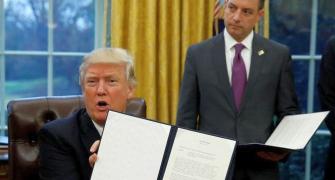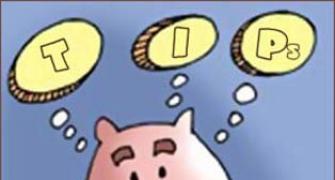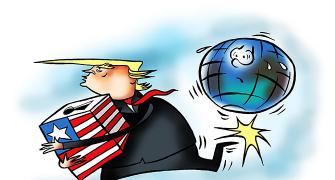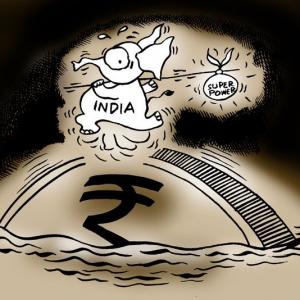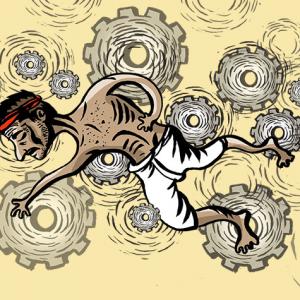Abheek Barua & Bidisha Ganguly explain why the US treasury should intervene if the overvalued greenback continues to rise.
Illustration: Dominic Xavier/Rediff.com
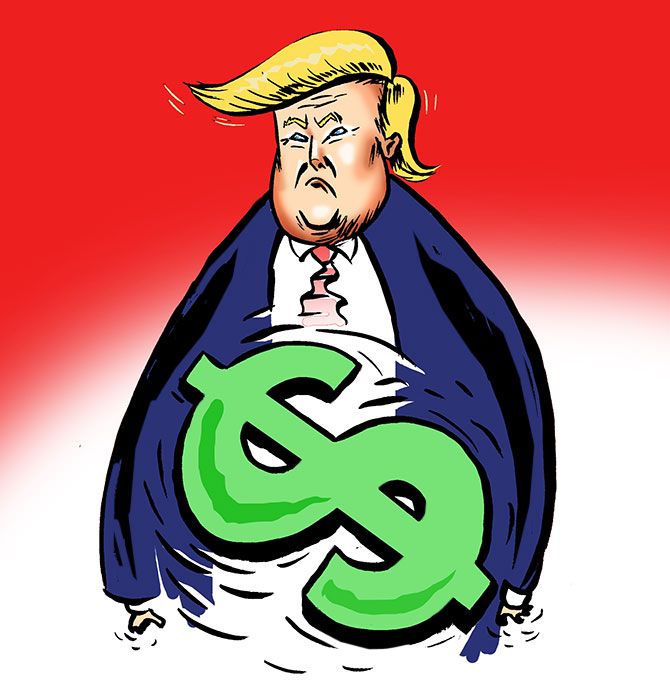
If there's one thing that could stand in the way of Donald Trump's grand plans of ramping America's economic growth up using fiscal stimulus, which is a combination of aggressive tax cuts and massive government spending, it would be the rising value of the US dollar.
Since the November US election results, the dollar index (a weighted average of the US dollar's exchange rate versus major trading partners) is up by about 4.5 per cent. This came on top of a secular rise in the dollar over the last five years: Between September 2011 and October 2016 the index was up by about 35 per cent.
What these numbers show categorically is the fact that the dollar is hugely overvalued and, hence, uncompetitive. This could adversely impact both aggregate growth and more specifically the Trump revival project for US manufacturing.
In a sense, the dollar's response to Trump's election and the likely implementation of his much touted grand economic plan is the financial market's way of telling the world that possible fiscal excess comes at a price and markets would do their very best to curb this.
The rise in the dollar has ridden on the back of a sharp rise in government bond yields in anticipation of a large budget deficit and an explosive path for government debt. The fact that the US Federal Reserve fretted about rising inflation and members of the monetary policy committee raised their median forecasts of interest rate hikes from twice in 2017 to thrice abetted the rise in the dollar.
There are two camps on the dollar's future in 2017.
One of them argues that much of the macroeconomic imbalances that aggressive Trumpnomics could breed are baked into the dollar's value. Besides, neither growth nor inflation is likely to shoot up (growth will remain in the tepid 2.5 per cent ballpark and that itself would put a lid on inflation), thus the dollar could stabilise at current levels against major currencies or perhaps go up just a tad more.
The other camp believes that as the minutiae of the Trump plan unfolds after he assumes office on January 20, there is more momentum left in the dollar.
But if it does and, as the textbooks tell us, begins to impinge on growth, what could the US do?
Carmen Reinhart, Harvard professor and well-known expert on international finance (and incidentally an ex-professor of ours), argues that if things spin out of control, one might not rule out intervention in the dollar market by the US treasury.
The received wisdom is that currency market intervention is usually done by emerging markets while the G-7 heavyweights leave exchange rates to the dictates of the market and the only form of intervention that they prefer is of the verbal kind. While that is partly true, there have been recent instances where there has been active meddling by developed market central banks.
Reinhart points out the case of the peg that Swiss central bank introduced in September 2011 to manage the effects of a plunging euro against the Swiss franc. Japan's treasury has also been known to buy and sell dollars in drips and drabs.
The last time the American treasury intervened was way back in the early 1990s.
However, the "mother" of all interventions came in September 1985 at New York's Plaza hotel, when US central bankers and treasury officials thrashed out a deal to halt the massive rise of the US dollar in the preceding years — between 1978 and 1984, the dollar index was up by 75 per cent. This was the famous Plaza Accord that resulted in a combination of both coordinated statements by central banks and actual intervention through the sale and purchase of the greenback.
However, as Reinhart and others point out, getting the US' counterparts to sit across a table and negotiate a deal might not be feasible. We certainly don't see China wanting to participate or for that matter euro zone officials wanting to help the US (the euro's competitiveness has taken a quantum jump on the back of dollar gains).
Thus, if it wants to hold the dollar down, the US might have to go it alone. But if indeed the greenback sees another round of sustained gains, intervene they must.
Abheek Barua is chief economist, HDFC Bank.
Bidisha Ganguly is chief economist, CII.


